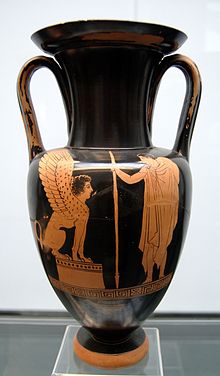Achilles Painter
Achilles Painter | |
|---|---|
 Oedipus and the Sphinx, amphora by the Achilles Painter, located in the Staatliche Antikensammlungen, Berlin, Number SL 474 | |
| Born | Unknown. Name assigned by Beazley after a theme of Achilles painted on a Lekythos in the Vatican Museums. Before 470 BC Probably Athens |
| Died | About 425 BC |
| Nationality | Greek |
| Education | Berlin Painter's workshop |
| Known for | Pottery-making, vase painting. He took over the Berlin Painter's workshop. |
| Notable work | Over 200 vases, mainly funerary lekythoi |
| Movement | red-figure style, white ground technique |
The Achilles Painter was a vase-painter active ca. 470–425 BC. His name vase is an amphora, Vatican 16571, in the Vatican museums depicting Achilles and dated 450–445 BC. An armed and armored Achilles gazes pensively to the right with one hand on his hip. The other hand holds a spear. On the opposite surface a woman performs libation.[1]
J. D. Beazley attributed over 200 vases to his hand, the largest share being red-figure and white-ground lekythoi. In his middle phase (ca. 450–445 BC), he decorates more open forms. The Achilles Painter was a late pupil of the Berlin Painter.[2]
The Phiale Painter became the Achilles Painter's most prominent student after he assumed the Berlin Painter's workshop. Almost a dozen other recognizable painters passed through the Achilles Painter's workshop as well. Notable painters include the Westreenen Painter, the Persephone Painter, the Clio Painter, Loeb Painter, and the Dwarf Painter. The Kleophon Painter, the Sabouroff Painter, and the Painter of Munich 2335 all spent time at the workshop as well.
Appraisal
[edit]Beazley describes him thus:
- He is the great master of the white lekythos. His red-figure vases nearly always have a sober beauty, but few of them–like the pointed amphora in the Cabinet des Médailles–reach the height of his best white lekythoi, which are among the masterpieces of ancient drawing.[3]
In 1962, Greece issued a stamp featuring the decoration of an Achilles Painter white-ground lekythos.[4]
Findspots
[edit]- Acropolis, Athens
- Ceramicus, Athens
- Capua, Italy
- Pisticci, Italy
- Taranto, Italy
- Vulci, Italy
- Selinis, Sicily
- Enna, Sicily
- Attica
- Eretria
- Euboea
References
[edit]- ^ J.H. Oakley. "The Achilles Painter". Perseus Digital Library, Tufts University. Retrieved 2 July 2012.
- ^ J.D. Beazley, Attic Red-figure Vase-painters (2nd ed., Oxford, 1963) 986.
- ^ Beazley, ibid.
- ^ Athens NM 1818.
Further reading
[edit]- Andrew J Clark; Maya Elston; Mary Louise Hart (2001). "Achilles Painter". Understanding Greek Vases: A Guide to Terms, Styles, and Techniques. J. Paul Getty Museum. Los Angeles: Getty Trust Publications. p. 31. ISBN 9780892365999.
External links
[edit]![]() Media related to Achilles Painter at Wikimedia Commons
Media related to Achilles Painter at Wikimedia Commons
